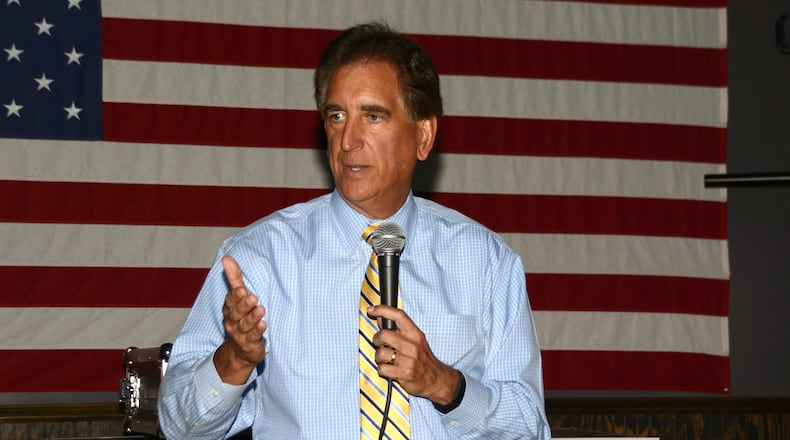In an interview with the Dayton Daily News on Friday Renacci said he did not agree with Trump’s opinion.
“I just don’t agree with the way it was said. I don’t agree with the way it was presented,” Renacci said.
He said a businessman involved in politics may not always understand the need to use caution in wording statements.
“And again, when you’re trying to get some things accomplished I think sometimes you’ve got to watch how you say things and why you say things and I just would not have said it. It’s just not my style of negotiating,” Renacci said.
“But again, President Trump is a different type of person and he says things different than I would. I just would not have said it that way.”
RELATED: Trump: Why allow immigrants from ‘shithole countries’?
Trump has acknowledged making “tough” remarks while meeting with a bipartisan group of lawmakers on immigration reform in a Thursday Oval Office meeting, but this weekend denied that he used that phrase.
One Senator who attended the meeting, Sen. Richard J. Durbin, D-Ill., said Trump used the words; two senators there, Sens. Tom Cotton, R-Ark., and David Perdue, R-Ga., said Sunday that he did not.
Trump’s alleged use of the vulgar term has been widely criticized as racist. Trump spoke to reporters Sunday and denied the charge.
U.S. Sen. Sherrod Brown, D-Ohio, blasted Renacci and Trump’s comments.
“I disagree with Congressman Renacci’s characterization that President Trump’s disgusting and hateful comments about immigrants were speaking for what many Americans are thinking,” said U.S. Sen. Sherrod Brown, D-Ohio. “The President certainly isn’t speaking for me and he isn’t speaking for a great majority of people across Ohio.”
Renacci, a Wadsworth businessman who has been in Congress since 2011, dropped out of the race for Ohio governor and entered the Republican primary for U.S. Senate on Thursday after he said Trump Administration officials met with him Wednesday and asked him to join the race. He said he gave those officials a list of what he would need to enter the race “six to eight months late” although he declined to say what that list included other than promises of political appearances with Trump and Vice President Mike Pence.
“I needed to make sure that when he came in that I’d be with him, that when the vice president comes in that I’d be with him,” Renacci said. “Everything that I needed to step into this thing they were willing to comply with.”
Renacci faces investment banker and first time political candidate Mike Gibbons, who was already in the GOP race when front-runner, Ohio Treasurer Josh Mandel, dropped out Jan. 5 due to family issues.
RELATED: Ohio Republican Senate race battle of multimillionaires
The winner of the May 8 primary would face Brown in the November General Election.
Renacci and Gibbons are both characterizing themselves as outsider businessmen who can bring change to Washington. Asked how a man with seven years in Congress running for a six-year term in the U.S. Senate is an “outsider,” Renacci said, “I don’t like Washington. I don’t like career politicians.”
“I went to Washington for the same reason Mike Gibbons wants to go to Washington. The only difference is he’s seven years behind me,” Renacci said. “The good thing now is I’ve been in the belly of the beast and can see how difficult it is to make a difference.”
Gibbons’ campaign spokesman Chris Schrimpf called Renacci “a professional politician and Washington insider who is so desperate to climb the political ladder that he doesn’t even care what office he is running for.”
“If it looks like his political career might end, he just switches races. Mike on the other hand is a real outsider who has never run for office; making him the best candidate to defeat another career politician — Sherrod Brown,” Schrimpf said.
RELATED: Mike Gibbons says he will beat Sherrod Brown, puts $5M in Senate race
Renacci said he intends to focus on the nation’s growing deficit, reforming immigration and repairing infrastructure. He voted for the $1.5 trillion Republican tax cut and says Congress now needs to cut spending as revenues decline.
“So I am a big believer that we are going to have to look at all spending, we’re going to have to look at Medicaid, Medicare and Social Security,” Renacci said. “I think the Social Security program was put in place to help those at the age of 65 supplement their retirement not be their retirement, but supplement their retirement. I think we need to look at that. I think we need to build programs that allow people to grow for their own retirement.”
Staff writer Jim Otte contributed to this report.
This article was updated Jan. 15 to reflect developments since the first report of the meeting.
Other stories by Lynn Hulsey
Year in Review - The Miami Valley 2017
Departures, 2018 election may reshape county government
Officials tout new bestiality law but say cases are tough to prove
About the Author



